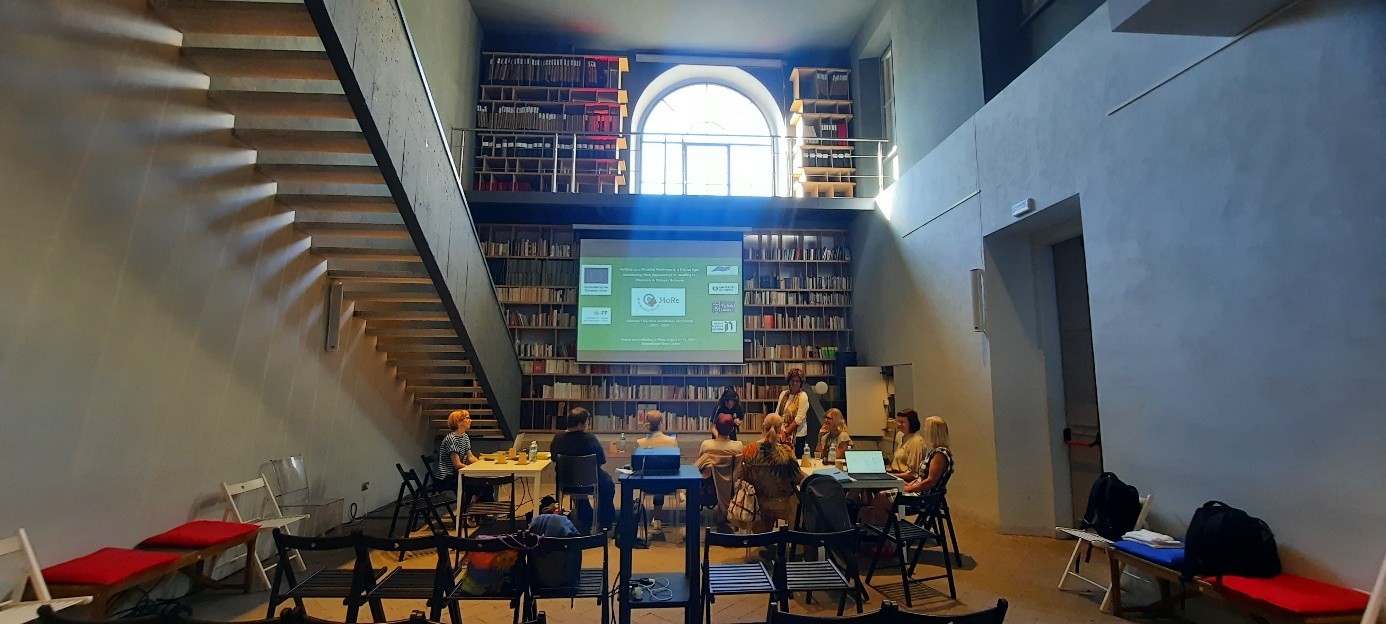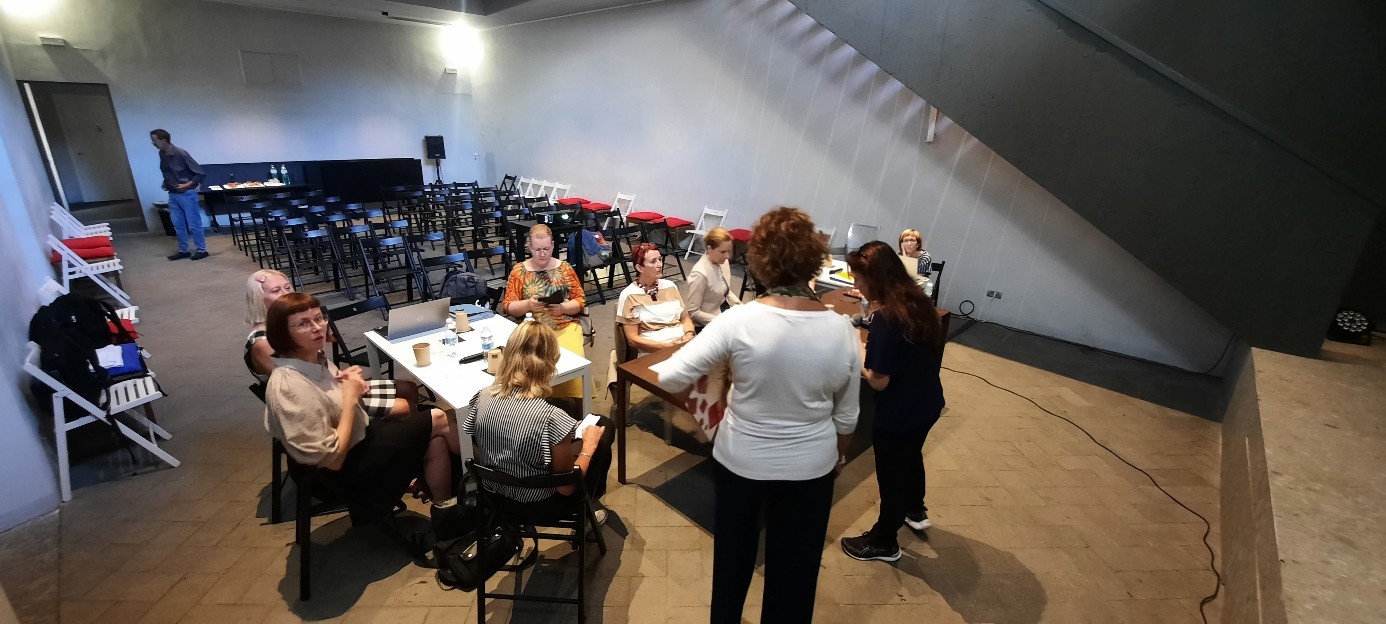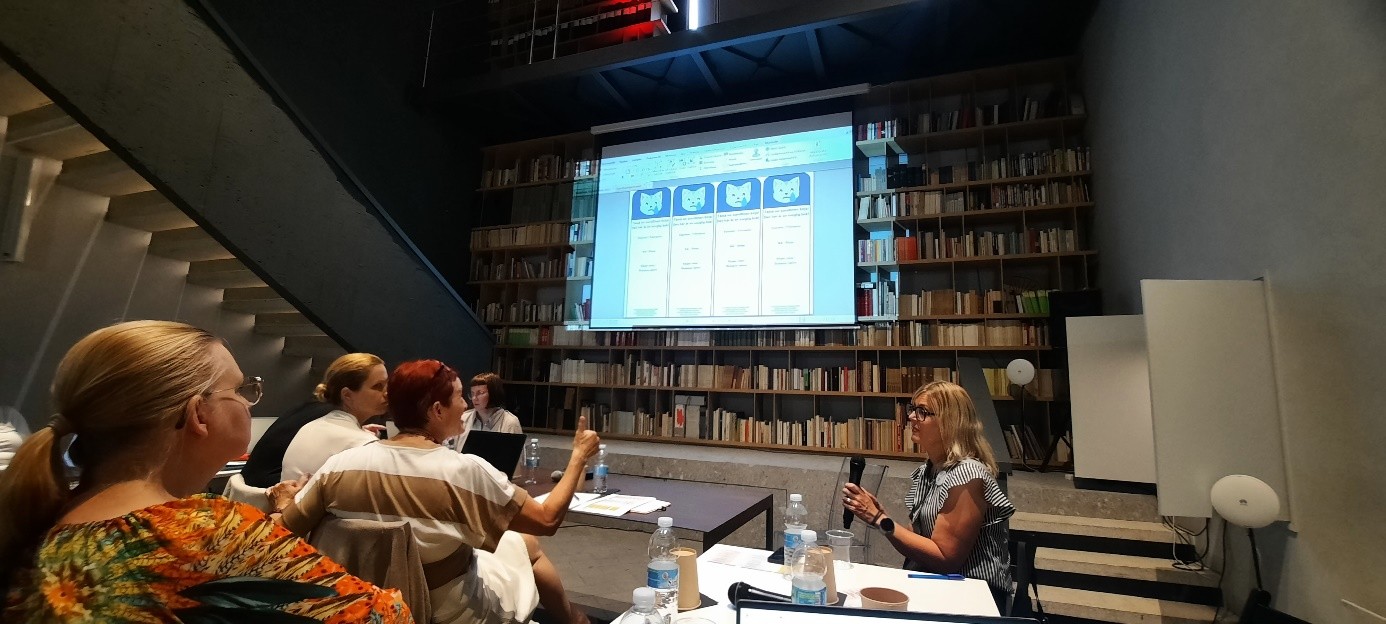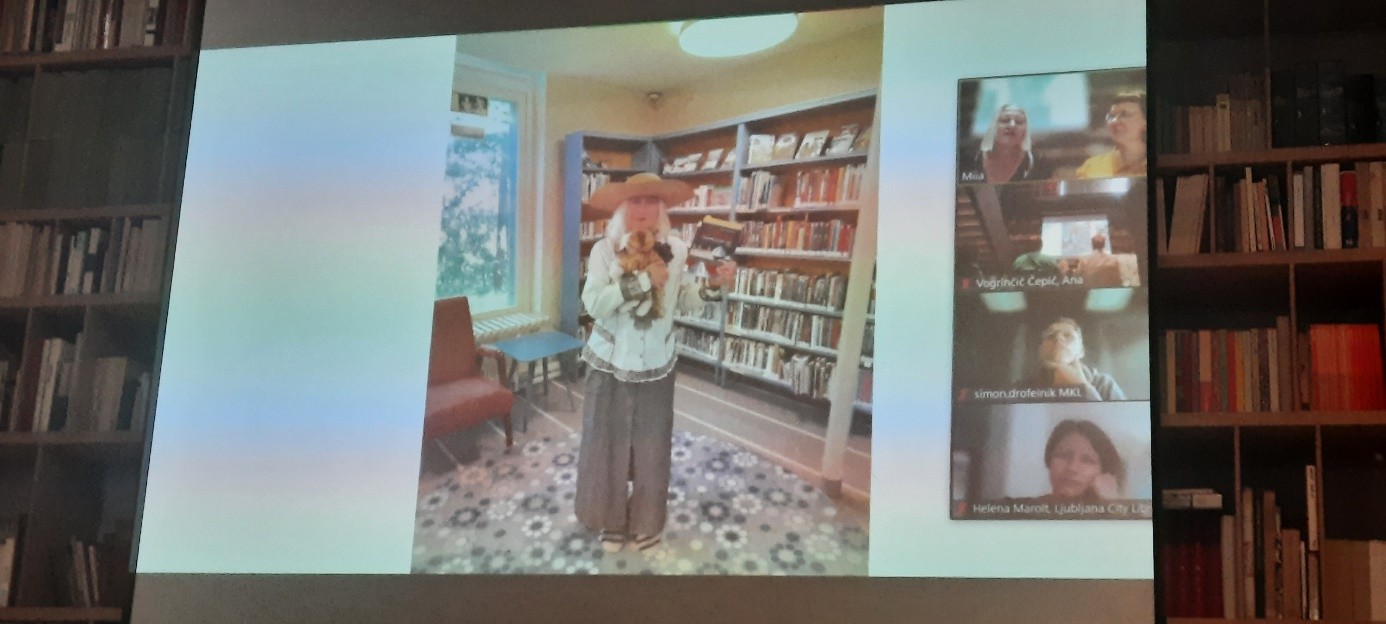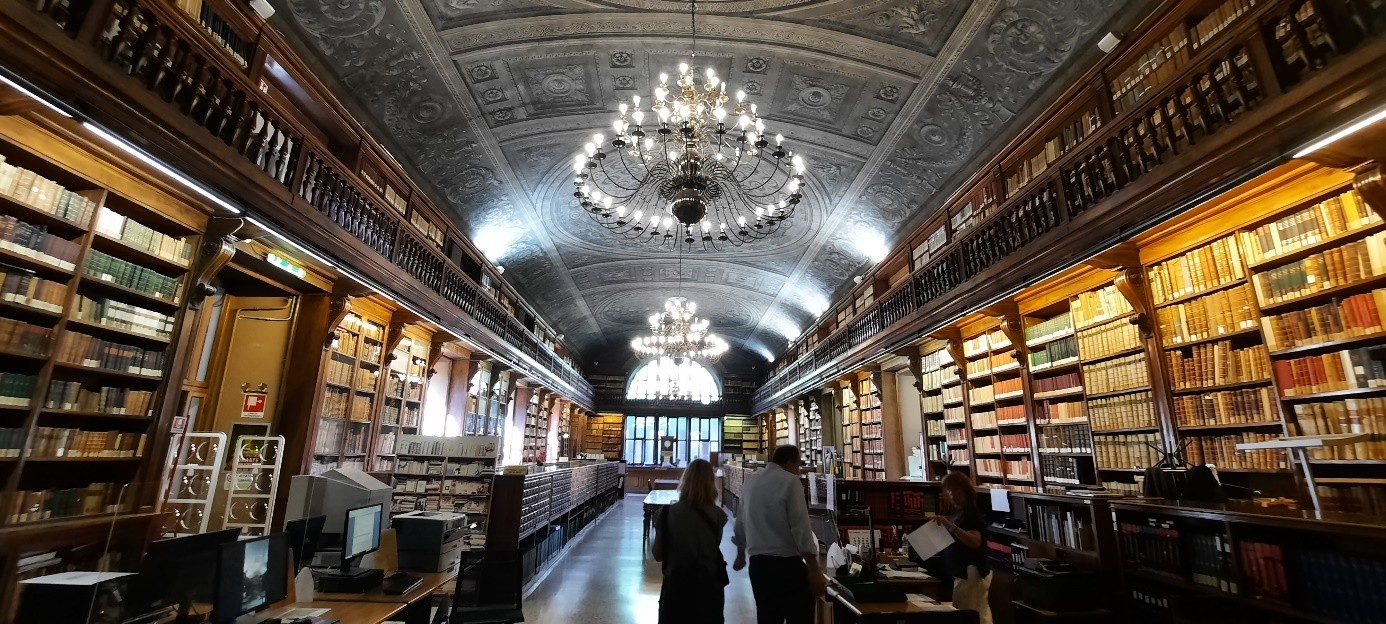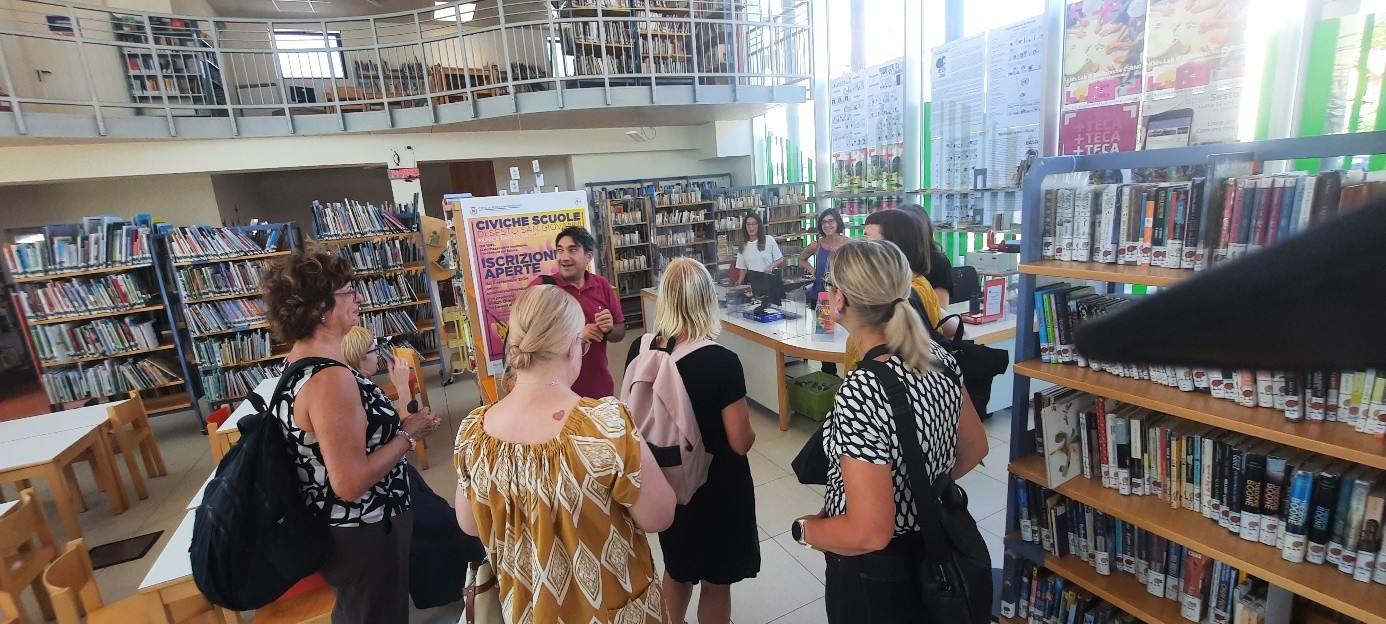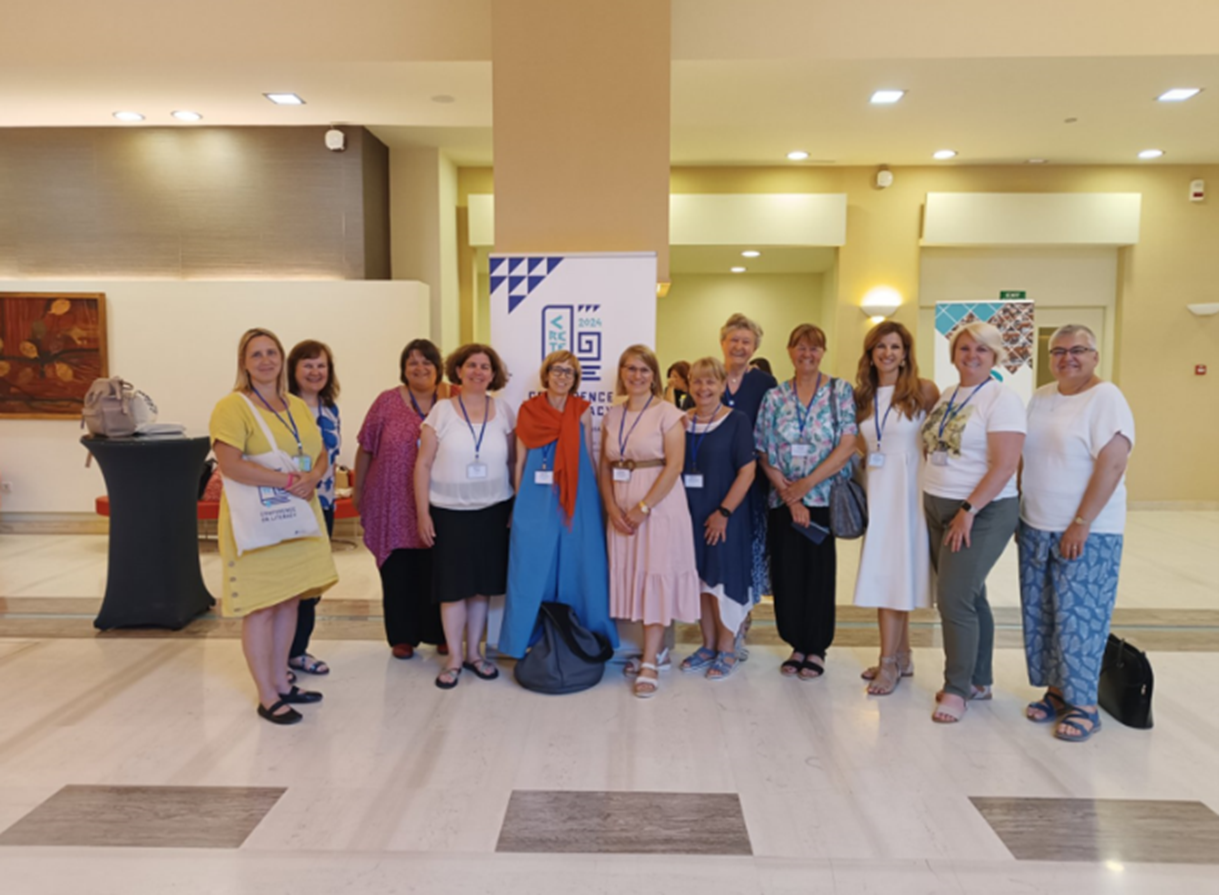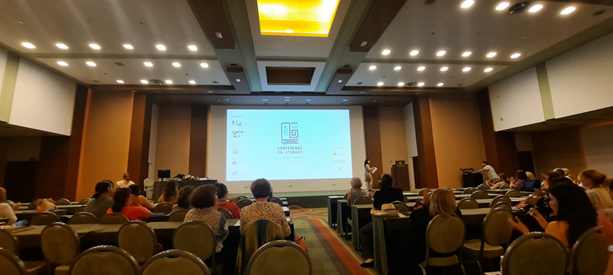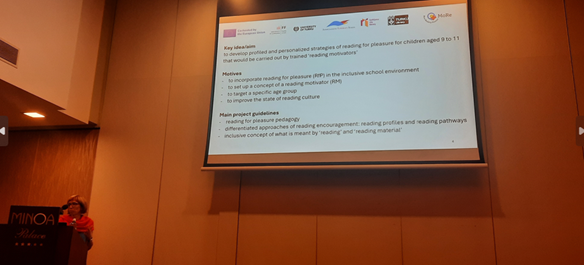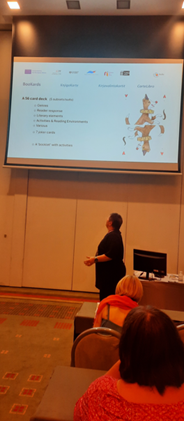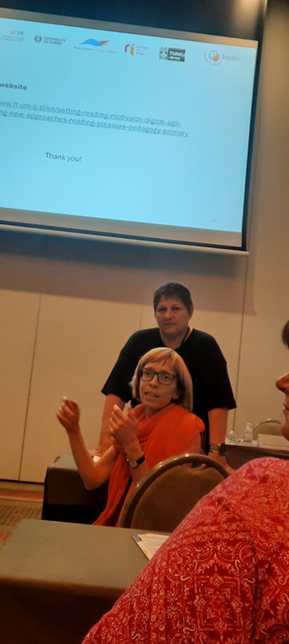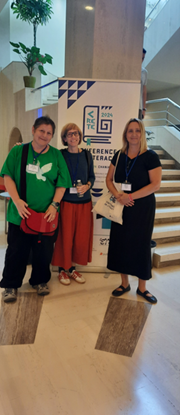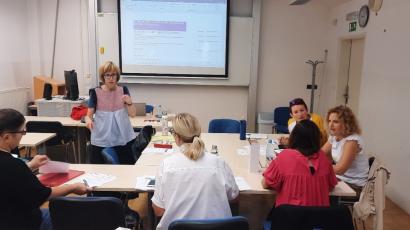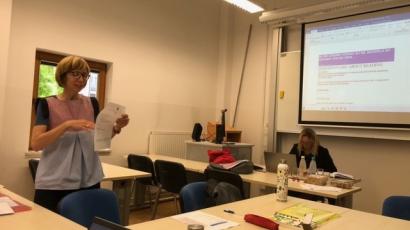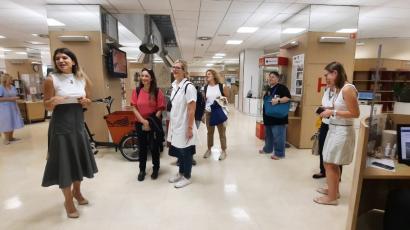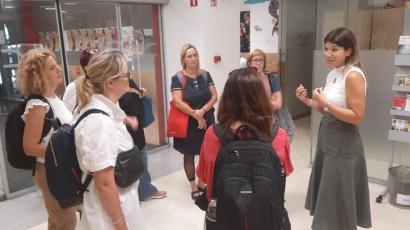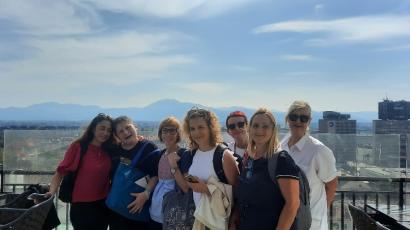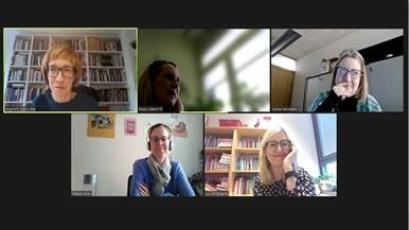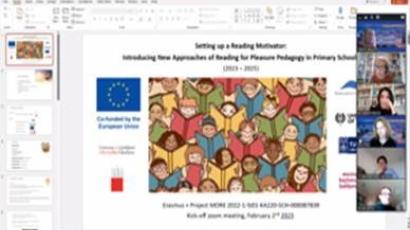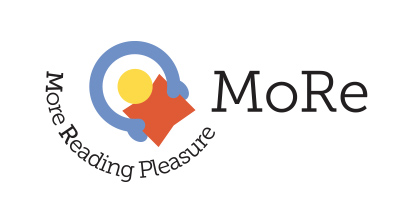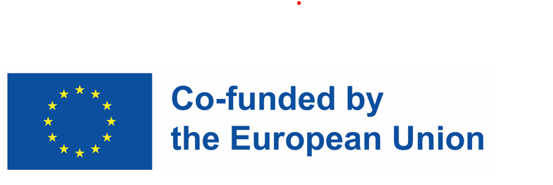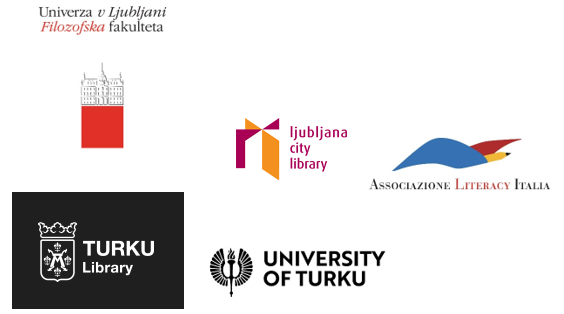
Setting up a Reading Motivator in the Digital Age: introducing New Approaches of Reading for Pleasure Pedagogy in Primary Schools (MORE)
About the project
| Title of the project | Setting up a Reading Motivator in the Digital Age: introducing New Approaches of Reading for Pleasure Pedagogy in Primary Schools (MORE) | |
| Project number | 2022-1-SI01-KA220-SCH-000087839 | |
| Project and Action Type | Erasmus+, KA220-SCH - Cooperation partnerships in school education | |
| Project duration | 31. 12. 2022 – 30.12. 2025 | |
| Project coordinator | Assoc. Prof. Ana Vogrinčič Čepič | |
| Project coordinator | University of Ljubljana, Faculty of Arts (Slovenia) | |
| Participating organizations | Turku University (Finland) | |
| Turku City Library (Finland) | ||
| Italian Literacy Association (Italy) | ||
| Ljubljana City Library (Slovenia) | ||
| Contact | Mojca.Zaberl@ff.uni-lj.si, moreading.project@gmail.com |
Project Outline
In many European countries, research (PISA, PIRLS) has shown a significant decline in reading motivation in the 10+ age group. Low motivation for reading leads to unsatisfactory levels of reading literacy but also to low academic achievement, and lack of social and cultural participation.
By focusing on students 9 – 11 years of age, the project addresses the worrying trends by
1. acknowledging diversity (a variety of school and family settings, curricular specifics, reading experiences, a wide range of genres and formats in print and e-version etc),
2. studying the ways of introducing more possibilities for reading for pleasure in schools (which is an effective strategy to ascertain academic success),
3. proposing innovative approaches to encourage reading for pleasure and expanding the possibilities of good reading experiences in the digital age.
The research will be based on Reading for Pleasure Pedagogy (RfP). While taking into account different reading profiles, thorough research will be carried out to design a balanced theory and practice, and to create pedagogy for enhancing the reading of diverse readers.
Reading motivators will be introduced as a novelty, bridging the curricular and extracurricular programmes and activities. By organising workshops and offering individual consultations, they will encourage primary school students to read, and will cooperate with their teachers, school librarians and any other interested party, with the aim of introducing and implementing the newly designed Reading for Pleasure Pedagogy.
Implementation
First, a typology of reading profiles of elementary school students will be created based on an e-questionnaire.
Selected librarians, specialized in children's and YA literature, will be trained to act as reading motivators.
Reading profiles will serve as a key reference for creating various ‘reading pathways’ for encouraging students into reading according to their interests, abilities and motivations.
Then, a series of workshops for students aged 9 – 11 will be offered, and seminars for teachers and/or interested school staff.
The key evaluation phase will round up the project.
Project findings and materials will be disseminated throughout.
Expected Impacts
The project aims to empower each student with a good reading experience.
- A better understanding of the importance of Reading for Pleasure in the digital age, and its impact on the students' social and academic life will help pave a path to books and reading according to the students’ reading profiles, their wishes and needs.
- The full potential of reading motivators as drivers of reading for pleasure motivation will be realised through stronger, formal and possibly permanent links between educational institutions and reading motivators.
- The knowledge generated through research and practical workshops will inform the design of (e-)materials (handbooks and guidelines for the practitioners), and the publication of academic articles to enable further research.
Deliveries
- typology of reading profiles (for 9 to 11 year olds) and accompanying reading pathways
- materials and guidelines for educating the reading motivators
- handbook of good practices in reading for pleasure pedagogy for primary school students
Project coordinator
Assoc. Prof. Ana Vogrinčič Čepič (University of Ljubljana, Faculty of Arts, Department of Sociology, Department of Library and Information Science and Book Studies, Slovenia)
Slovenian Team
Project leader
Assoc. Prof. Ana Vogrinčič Čepič (University of Ljubljana, Faculty of Arts, Department of Sociology, Department of Library and Information Science and Book Studies)
Project members
Assistant Veronika Rot Gabrovec (University of Ljubljana, Faculty of Arts, Department of English)
Prof. Sonja Pečjak (University of Ljubljana, Faculty of Arts, Department of Psychology)
Assist. Prof. Tina Pirc (University of Ljubljana, Faculty of Arts, Department of Psychology)
Senior Bibl. Mojca Žaberl (University of Ljubljana, Faculty of Arts, Department of Sociology)
and
Senior Bibl. Mateja Lesar (City Library Ljubljana, Professional associate for education)
Finish team
Project leader
Adjunct Prof./Senior Lect. Juli-Anna Aerila (University of Turku, Faculty of Educational Sciences, Department Teacher Education)
Project members
Service Manager Sanna Hernelahti (Turku City Library)
Italian team
Project leader
Adjunct Prof./Senior Lect. Tiziana Mascia (Associazione Literacy Italia)
Project members
Adjunct Prof./Senior Ugo Guidolin (Associazione Literacy Italia)
Senior Bibl. Francesco Grande (Associazione Literacy Italia)
Senior Bibl. Valentina Bondesan (CSBNO)
Assoc. Prof. Ana Vogrinčič Čepič
VOGRINČIČ ČEPIČ, Ana. Kako lahko zapeljujemo v branje skozi pogovor in poučevanje. Otrok in knjiga : revija za vprašanja mladinske književnosti, književne vzgoje in s knjigo povezanih medijev. 2021, letn. 48, št. 112, str. 95-107. ISSN 0351-5141. [COBISS.SI-ID 96440835]
VOGRINČIČ ČEPIČ, Ana. Branje kot prostorska praksa : odnos bralcev do neposrednega fizičnega prostora branja. V: SAMIDE, Irena (ur.), VIRANT, Špela (ur.). Prostor = Space. Ljubljana: Znanstvena založba Filozofske fakultete: = University Press, Faculty of Arts, 2019. 13, [št.] 2, str. 163-183. Ars & humanitas, 13, 2. ISBN 978-961-06-0283-5. ISSN 1854-9632. https://revije.ff.uni-lj.si/arshumanitas/article/view/8982/8828, DOI: 10.4312/ars.13.2.163-183. [COBISS.SI-ID 70932322]
VOGRINČIČ ČEPIČ, Ana, KOTRLA TOPIĆ, Marina. If you read at home, it's more relaxed, there are no limits : insights into domestic reading practices of Croatian and Slovenian university students. Literacy. 2021, vol. 55, no. 3, str. 181-190. ISSN 1741-4350. https://onlinelibrary.wiley.com/doi/epdf/10.1111/lit.12251, DOI: 10.1111/lit.12251. [COBISS.SI-ID 62495491], [JCR, SNIP]
VOGRINČIČ ČEPIČ, Ana, KUZMIČOVÁ, Anežka, DIAS, Patrícia. Vpliv fizičnega prostora in družbenega okolja na bralno izkušnjo : izsledki študije šestih fokusnih skupin = Reading experience and the impact of physical and social environment : a study of six focus groups. Knjižnica : revija za področje bibliotekarstva in informacijske znanosti. [Tiskana izd.]. okt. 2018, 62, [št.] 3, str. 51-67. ISSN 0023-2424. https://knjiznica.zbds-zveza.si/knjiznica/article/view/7140. [COBISS.SI-ID 68560738]
Assistant Veronika Rot Gabrovec
Prof. Sonja Pečjak
PEČJAK, Sonja, BUCIK, Nataša, GRADIŠAR, Ana, PEKLAJ, Cirila (2006). Bralna motivacija v šoli : merjenje in razvijanje [Reading motivation in school: measurement and development]. 1.izdaja. Ljubljana: Zavod Republike Slovenije za šolstvo. ISBN 961-234-578-3, ISBN 978-961-234-578-5. [COBISS.SI-ID 229401344]
PEČJAK, Sonja (2012). Psihološki vidiki bralne pismenosti : od teorije k praksi [Psychological aspects of reading literacy: from theory to practice]. 1. izd. Ljubljana: Znanstvena založba Filozofske fakultete, Zbirka Razprave FF. ISBN 978-961-237-401-3. [COBISS.SI-ID 261427456]
PEČJAK, Sonja, KOLIĆ-VEHOVEC, Svjetlana, PODLESEK, Anja (2014). Models of reading comprehension for primary school students. V: GALMONTE, Alessandra (ur.), ACTIS-GROSSO, Rossana (ur.). Different psychological perspectives on cognitive processes : current research trends in Alps-Adria region. Newcastle upon Tyne: Cambridge Scholars Publishing, ISBN 978-1-4438-5628-7, ISBN 1-4438-5628-2. [COBISS.SI-ID 56792418]
Assist. Prof. Tina Pirc
PEČJAK, Sonja, PODLESEK, Anja, PIRC, Tina. Model of reading comprehension for 5th grade students. Studia psychologica. 2011, vol. 53, no. 1, str. 53-67, ilustr. ISSN 0039-3320. [COBISS.SI-ID 45449314]
PEČJAK, Sonja, PIRC, Tina. Ali se oblikuje bralno razumevanje pri dekletih drugače kot pri fantih?. Pedagoška obzorja : časopis za didaktiko in metodiko. 2010, letn. 25, št. 2, str. 51-66. ISSN 0353-1392. [COBISS.SI-ID 42951010]
PEČJAK, Sonja, BUCIK, Nataša, PEŠTAJ, Martina, PODLESEK, Anja, PIRC, Tina. Bralna pismenost ob koncu osnovne šole : ali fantje berejo drugače kot dekleta?. Sodobna pedagogika. mar. 2010, letn. 61, št. 1, str. 86-102. ISSN 0038-0474. [COBISS.SI-ID 247712]
Adjunct Prof./Senior Lect. Juli-Anna Aerila
Edited book (peer-reviewed)
Moran, K. J. K. & Aerila, J.-A. (2019) Story in the Lives of Children: Contributions of the Narrative Mode. New York: Springer.
Chapters in edited peer-reviewed book
Aerila, J.-A., Lähteelä, J., Kauppinen, M., & Siipola, M. 2021. Holistic Literature Education as an Effective Tool for Social-Emotional Learning. In J. Tussey & L. Haas (Eds.), Handbook of Research on Supporting Social-Emotional Learning Through Literacy Education. Pennsylvania, USA: IGI-Global, 26–49.
Aerila, J.-A. & Kauppinen, M. (2020). StoRe – Stories make readers. Enhancing the Use of Fictional Literature with Multilingual Students. In G. Neuokleous, A. Krulatz. & R. Farelly (Eds.) Handbook of Research on Cultivating Literacy in Diverse and Multilingual Classrooms. Hersley, P.: IGI-Global.
Merisuo-Storm, T. & Aerila, J.-A. (2018). Boys’ reading skills and attitudes during the first six school years. In Baldwin, P. & García, P. O. (Eds.) Reading motivation and achievement differences between boys and girls. New York: Springer
Articles
Aerila, J.-A., Lähteelä, J., Mäkelä, T. & Kauppinen, M. (2020). Enhancing the Readership of Teacher Students with Digital Book Subscription Services. International Journal of Digital Literacy 11(2).
Aerila, J.-A. & Merisuo-Storm (2017) Emergent Readers and the Joy of Reading: A Finnish Perspective. Creative Education 8(15) 2485-2500.
Merisuo-Storm, T. & Aerila, J.-A. (2016). Providing skills and support to primary school pupils in content-area reading. International Journal for Cross-Disciplinary Subjects in Education, 7(3).
Adjunct Prof./Senior Lect. Tiziana Mascia
Mascia, T. (2023). MEL: Model for Literacy Education: Teacher education and professional development in literacy teaching. In P. Falzetti (Ed.), The school and its protagonists: the teachers. V Seminar “INVALSI data: a tool for teaching and scientific research” (Invalsi per la ricerca. Studi e Ricerche, pp. 41–61). Franco Angeli. Available from: https://series.francoangeli.it/index.php/oa/catalog/view/940/792/5403
Todaro L., Mascia T. (2022), Libri per ragazzi: formazione della coscienza ecologica e trasformazioni correnti negli ambiti della non-fiction, Italica Wratislaviensia, 13(2), 131–148. Available from: https://czasopisma.marszalek.com.pl/images/pliki/iw/13_2/iw13206.pdf
Mascia, T. (2021). Sviluppi della letteratura di divulgazione scientifica giovanile e prospettive attuali, in L’evoluzione della letteratura giovanile dal secondo dopoguerra a oggi, Numero monografico Pagine Giovani, 2–3 (178). Available from: https://www.morcelliana.net/img/cms/rassegna%20stampa/2021-12-NOBILE-STORIA-LETTERATURA-GIOVANILE-SCHOLE-PAGINE-GIOVANI1.pdf
Mascia, T. (2020). Percorsi del lettore. Teorie e buone pratiche per la formazione. Avellino: Edizioni Sinestesie. ISBN: 978-88-31925-60-0 ebook. Available from: https://www.edizionisinestesie.it/libri/i-percorsi-del-lettore-teoria-e-buone-pratiche-per-la-formazione/
| EVENT | TITLE | DATE | PERSON | INSTITUTION | LINK |
| Web page of the project | Web page of the project | januar 2023 | Project coordinator team | FF | https://www.ff.uni-lj.si/bralni-motivatorji-v-digitalni-dobi-novi-pristopi-za-spodbujanje-branja-za-uzitek-v-osnovni-soli |
| Lectures at Faculty of arts | Lectures at Faculty of arts | oktober 2023 | dr. Ana Vogrinčilč Čepič | FF | live |
| Lectures at Faculty of arts | Lectures at Faculty of arts | oktober 2023 | dr. Tina Pirc | FF | live |
| Round table, Frankfurt Book Fair | Round table, Frankfurt Book Fair | 18.10.2023 | dr. Veronika Rot Gabrovec | FF | live |
| Lecture for principals of slovenian primary schools and highschools | Lecture for principals of slovenian primary schools and highschools | november 2023 | dr. Sonja Pečjak | FF | live |
| Web page project presentation | Web page of Literacy Italia | Februar 2023 | dr. Tiziana Mascia | ALI | https://www.literacyitalia.it/erasmus-project-more-english/ |
| National Action Plan for the Promotion of Reading in Schools. Program for the Training Course in the Marche region for School Library Representatives | La motivazione alla lettura nei giovani | marec 2023 | dr. Tiziana Mascia | ALI | http://www.marche.istruzione.it/allegati/2023/2_Piano_nazionale_dazione__Erogazione_formazione_regionale_signed.pdf |
| Educare alla lettura con il reading workshop. Metodo e strumenti per la scuola primaria e secondaria | Motivare alla lettura | marec 2023 | dr. Tiziana Mascia | ALI | Erickson conference in Trento (Italy) |
| Training course for Teachers | Motivare alla lettura (corso 9) | marec 2023 | dr. Tiziana Mascia | ALI | https://www.literacyitalia.it/corsi/motivare-alla-lettura/ |
| Conference at Bologna Children's BookFair | Fare scuola con le storie. La ricerca sull'educazione alla lettura | marec 2023 | dr. Tiziana Mascia | ALI | https://www.bolognachildrensbookfair.com/about/archivio-online-edition-2021/programma-eventi-espositori/10953.html |
| Regional training for School Libraries in Emilia Romagna. | Come motivare alla lettura: il circolo virtuoso del lettore | april 2023 | dr. Tiziana Mascia | ALI | https://www.istruzioneer.gov.it/wp-content/uploads/2023/03/SEGNATURA_1678377765_formazione-webinar-corsisti-1.pdf |
| Conference on Literacy in Sheffield | Profiling Readers to Structuring Educational Paths: Guiding Principles for Effective Programs Promoting Reading Motivation and Literacy | junij 2023 | Tiziana Mascia & Juli-Anna | ALI | https://www.sheffield.ac.uk/education/research/literacies-and-language/conference-programme-2023 |
| Seminar in the municipality of Venice | Presentation Literacy per la cittadinanza attiva: esperienze, idee e futuro | september 2023 | dr. Tiziana Mascia | ALI | https://www.literacyitalia.it/corsi/literacy-per-la-cittadinanza-attiva-esperienze-idee-futuro/ |
| Training course for Librarians | Bibliotecari consulenti di lettura | oktober 2023 | dr. Tiziana Mascia | ALI | https://www.literacyitalia.it/corsi/disseminare-la-lettura-perche-sia-accessibile-bibliotecari-consulenti-di-lettura/ |
| Lectures at Faculty of Education at University of Urbino | Formare lettori indipendenti/Cultivating independent readers | oktober 2023 | dr. Tiziana Mascia | ALI | https://www.uniurb.it/syllabi/263490 |
| Web page project presentation Italian schools | Web page of Literacy Italia | oktober 2023 | dr. Tiziana Mascia | ALI | https://www.literacyitalia.it/corsi/motivatore-alla-lettura-nellera-digitale-introdurre-nuovi-approcci-alla-pedagogia-del-leggere-per-piacere/ |
| Communication on Social media | Facebook page of Literacy Italia | oktober 2023 | dr. Tiziana Mascia | ALI | https://www.facebook.com/literacyitalia/ |
| Predstavitev projekta v okviru predmeta Sociologija branja FF UL | Predstavitev projekta v okviru predmeta Sociologija branja FF UL | oktober/december 2023 | doc. dr. Ana Vogrinčilč Čepič | FF UL | |
| KUD Sodobnost Seminar za učitelje in knjižničarje | KUD Sodobnost Seminar za učitelje in knjižničarje | 30.05.2023 | dr. Veronika Rot Gabrovec | KUD Sodobnost | |
| ZPMS Seminar za mentorje Bralne značke | ZPMS Seminar za mentorje Bralne značke | 14.09.2023 | dr. Veronika Rot Gabrovec | ZPMS Bralna značka | |
| Srečanje z raziskovalko Sandie Mourão (Universidade de NOVA, Lisboa) | Srečanje z raziskovalko Sandie Mourão (Universidade de NOVA, Lisboa) | 24.10.2023 | dr. Veronika Rot Gabrovec | FF UL | |
| Posvetovanje Branje & najstniki? #kr neki?: Sekcija z mladinsko knjižničarstvo pri ZBDS | Posvetovanje Branje & najstniki? #kr neki?: Sekcija z mladinsko knjižničarstvo pri ZBDS | 9.11.2023 | dr. Veronika Rot Gabrovec | MKL KOŽ | |
| Predstavitev projekta na srečanju programskega odbora Bralne značke | Predstavitev projekta na srečanju programskega odbora Bralne značke | 14.12.2023 | dr. Veronika Rot Gabrovec | ZPMS Bralna značka | |
| MKL projekti in sodelovanja (slo) | MKL projekti in sodelovanja (slo) | 2023- | MKL | https://www.mklj.si/projekti/bralni-motivatorji-v-digitalni-dobi-novi-p… | |
| MKL projekti in sodelovanja (eng) | MKL projekti in sodelovanja (eng) | 2023- | MKL | https://www.mklj.si/en/projects-and-cooperations/setting-up-a-reading-m… | |
| Letno poročilo MKL 2023 | Letno poročilo MKL 2023, str. 55, 66 | 2024 | MKL | https://www.mklj.si/wp-content/uploads/2024/03/LETNO_POROCILO_MKL_2023-1.pdf | |
| Čajanka Bralne značke 2024 | Izven okvira FF | 15.02.2024 | Vitja Bizjak, Eva Gašperič, Veronika Rot Gabrovec | ZPMS Bralna značka | |
| Knjižničarske novice | Bralni motivatorji v digitalni dobi | 13.03.2024 | Mojca Žaberl, Mateja Lesar | FF, MKL | https://knjiznicarske-novice.si/bralni-motivatorji-v-digitalni-dobi/ |
| Predstavitev projekta "Bralni motivatorji v digitalni dobi: novi pristopi zapeljevanja v branje v osnovni šoli" | 6. bralna čajanka v šolskem letu 2023/2024 | 14.03.2024 | dr. Ana Vogrinčič Čepič | ZPMS Bralna značka |
| New Zealand Journal of Educational Studies | Reading for Pleasure: A Review of Current Research |
22.03.2024 |
dr. Ana Vogrinčič Čepič, Tuziana Mascia, Juli-Anna Aerila | FF, UT,ALI | https://link.springer.com/article/10.1007/s40841-024-00313-x |
| RTV SLO 1, Oddaja Dobro jutro | (Iz)beremo: bralne navade pri otrocih |
27.03.2024 |
Sonja Pečjak | FF | https://365.rtvslo.si/arhiv/dobro-jutro/175033188 |
| Novičnik Public Libraries 2030 | Ljubljana City Library: Setting up a reading motivator | 19.04.2024 | MKL | MKL | https://mailchi.mp/55b83cca9687/pl2030-newsletter-april-2024#:~:text=Ljubljana%20City%20Library%3A%C2%A0Setting%20up%20a%20reading%20motivator |
| Presentation of Ljubljana City Library for Librarianship students | Presentation of training for staff and the professional public | 8.5.2024 | Mateja Lesar | LCL | ||||||||
| Presentation of the project for new employees and students on internship at MKL | Presentation of the project for new employees and students on internship at MKL |
16.05.2023 |
Mateja Lesar | MKL | ||||||||
| Presentation of the MORE project at the 23rd European Literacy Conference | Reading Motivators in a Digital Age: New Approaches to Reading for Pleasure Pedagogy in Primary Schools - Report on an Erasmus project (2023 – 2025) |
24.06.2024 |
dr. Ana Vogrinčič Čepič, dr. Veronika Rot Gabrovec | FF UL | https://fela-crete2024.com/wp-content/uploads/2024/07/ABSTRACT-BOOK-FINAL-2-7-with-cover.pdf | |||||||
| Report on participation in the 23rd European Literacy Conference | Library news magazine | 22.07.2024 | Mojca Žaberl | FF UL | https://knjiznicarske-novice.si/porocilo-o-udelezbi-na-23-evropski-konferenci-o-pismenosti/ | |||||||
| Reading motivators and the pedagogy of reading for pleasure | Study meeting for primary school librarians, online | 29.8.2024 | Dr. Ana Vogrinčič Čepič | FA UL | ||||||||
| Revija Didactica Slovenica - Pedagoška obzorja | Reading motivation profiles in children and adolescents = Motivacijski profili bralcev pri otrocih in mladostnikih |
12.09.2024 |
[Sonja] Pečjak, [Tina] Pirc, [Ana] Vogrinčič Čepič | FF UL | https://www.dspo.si/index.php/dspo/article/view/133 | |||||||
| Reading Motivators in a Digital Age: New Approaches to Reading for Pleasure Pedagogy in Primary Schools | Afternoon at BINK: highlights of research activities at the department, presentation of the project for BINK students, Ljubljana |
14.10.2024 |
dr. Ana Vogrinčič Čepič | FF UL | https://dbl.si/vabljeni-na-popoldne-na-oddelku-bink-14-10-2024-filozofska-fakulteta-ul-pred-528/ | |||||||
| Presentation of a KA220 project case study | Presentation of the Erasmus+ MORE project to prospective applicants at the invitation of Cmepius, Ljubljana |
8.11.2024 |
Ana Vogrinčič Čepič | FF UL | ||||||||
| New Approaches of Reading for Pleasure Pedagogy and the Reading Profiles in Primary Schools | presentation at conference: The 3rd International Online Conference Fostering Dialogue: Teaching Children’s Literature and Reading for Fun at University, 21-23 november 2024 Universitat Internacional de Catalunya Faculty of Education Sciences |
21.11.2024 |
Ana Vogrinčič Čepič | FF UL | https://www.uic.es/en/congress/fostering-dialogue-teaching-childrens-literature-and-rea | |||||||
| Reading in the 3rd Millennium: Strategies for Motivating Reading in the Digital Age, Stara elektrarna, Ljubljana | Physical-material aspects of reading, reading conversation and personalised reading pathways: research findings from interviews, focus groups and an Erasmus+ project |
27.5.2025 |
Ana Vogrinčič Čepič | FF UL | ||||||||
News
The annual meeting of the programme group of the Erasmu+ project MORE: Reading Motivators in the Digital Age: New Approaches to Promote Reading for Enjoyment in Primary School project took place from September 9-10, 2024. This time the meeting was hosted by the partner organization Italian Literacy Association (ALI Italy).
In addition to the organisers dr. Tiziana Mascia and Ms. Assunta di Febo, and the Italian reading motivators, dr. Ana Vogrinčič Čepič, dr. Sonja Pečjak, dr. Tina Pirc, dr. Veronika Rot Gabrovec, Mojca Žaberl, (Slovenia), Dr. Juli-Anna Aerila, Sanna Hernelahti, Liisa Saarinen, Miia Utriainen (Finland) attended the meeting. Colleagues, future reading motivators in Slovenia, joined us online.
The working two-day meeting took place at Laboratorio Formentini, Milan. The main focus was on the review of the work done so far, i.e. review of the short questionnaire, the evaluation protocols, the trainings carried out so far for reading motivators, the preparation for the implementation of the workshops with children at schools, the review of the good practices of the workshops already carried out with children from Finland and the presentation of the motivational tool - reading cards BooKards.
Some highlights from the meeting discussions
First working day of the Milano Meeting (Laboratorio Formentini)
Disscussion of the reading motivation workshops
Analysis of the project work
Presentation of workshops in Finland
Visit to the Braidense National Library, Milan
Visit to the La Biblioteca dei Ragazzi di Sesto San Giovanni, Milan
Mojca Žaberl
12. 7. 2024
The 23rd European Literacy Conference was held in Chania, Greece, from 24th to 26th of June 2024. The Federation of European Literacy Associations FELA, in collaboration with the Hellenic Association for Language and Literacy, organized the conference. This year's theme was Literacy for All: New Challenges, New Perspectives.
The Federation of European Literacy Associations (FELA) is a network of 28 organizations whose main goal is to bring together all the people in Europe who are dedicated to promoting literacy at all levels of education. Members support practices in literacy teaching, learning and research, and together they form a lively, active and committed learning community. FELA organizes numerous meetings, conferences, seminars, webinars, exchange programmes, supports research and produces publications with the aim of achieving universal literacy in Europe. From Slovenia, The Slovenian Reading Association and The Slovenian Reading Badge Society - ZPMS participate in this network.
The conference addressed new challenges and new perspectives on literacy as a key part of human development. The contributions covered topics like literacy in the early years (for children aged 0-12), effective literacy teaching, digital literacy, different literacy environments, inclusive literacy practices for learners with different needs and lifelong development of literacy skills.
The team members who attended the conference were dr. A. Vogrinčič Čepič, dr. V. Rot Gabrovec, Mojca Žaberl and dr. Tiziana Mascia.
Dr. A. Vogrinčič Čepič in dr. V. Rot Gabrovec presented our project, its design and the results of our work so far. The presentation included the development of a long questionnaire for testing readers in primary schools, the development of a short questionnaire as a tool for profiling readers, and a course for reading motivators, which is currently running in all partner organizations. The presentation of the playing cards, which are currently being developed as a part of the project and will serve as a play-reading tool for working with young readers, proved particularly interesting to the participants. They expressed a desire for this tool to be made available online for the general public as soon as possible.
Over three days, hundreds of conference participants listened to and discussed various aspects of literacy, all of whom agreed that literacy is facing a significant challenge (decline) and that the future focus should be on developing critical and in-depth thinking skills. At the end of the ceremony it was announced that the 24th FELA Conference on Literacy will be held in Ljubljana in 2026. By that time we will be able to report on the project's completion and its outcomes.
Slovene section at 23rd Conference on Literacy, Crete, June, 2024
23rd Conference on Literacy, first day
Presentation of the More Project at the Conference, dr. A. Vogrinčič Čepič
Presentation of the More Project at the Conference, dr. Veronika Rot Gabrovec
Presentation of the More Project at the Conference, dr. A. Vogrinčič Čepič, dr. V. Rot Gabrovec
A part of Slovenian project team at the Conference (dr. A. Vogrinčič Čepič, dr. V. Rot Gabrovec, M. Žaberl)
A three-day annual meeting of the program group was held between September 11 and 13, 2023. The meeting was organized by the Faculty of Arts (FF), which is also the project coordinator. The project leader, dr. Ana Vogrinčič Čepič, and the Slovenian part of the team (dr. Sonja Pečjak, dr. Tina Pirc, dr. Veronika Rot Gabrovec and Mojca Žaberl) hosted colleagues from the partner organisations, dr. Juli-Anna Aerila from the University of Turku and dr. Tiziana Mascia, director of the Italian Literacy Association.
The meeting lasted three days and took place mainly at the Faculty of Arts. The focus of the meeting was on the preparation of an online questionnaire for children that will be the basis for developing a typology of different profiles of child readers, which is one of the main goals of the project. On Tuesday, September 12, we had a working meeting with Ms. Matej Lesar from the Slovenian partner organisation Ljubljana City Library (MKL). We met with librarians from MKL who will be trained as reading motivators as part of the project and will try to get as many children as possible to read using new approaches.
Some photos from the meeting discussions
In February, we successfully held an introductory meeting with partner organisations. We are pleased to collaborate with the University of Turku, Italian Literacy Association, Turku City Library and Ljubljana City Library.
